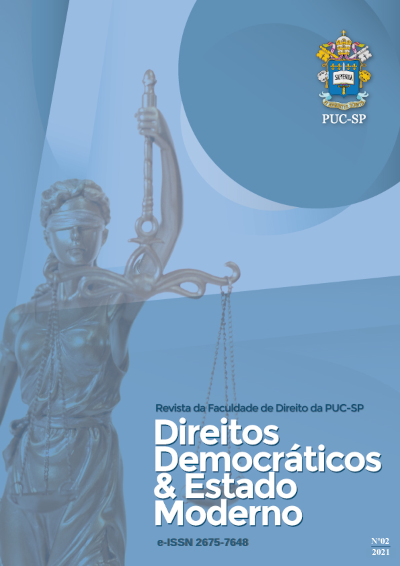Impartiality, liquid authoritarianity and exception in the Operação Lava Jato
DOI:
https://doi.org/10.23925/ddem.v0i2.50546Keywords:
Lava Jato, principle of impartiality, State of exception, exception criminal proceduresAbstract
The popularly known as “Operation Lava Jato” is understood in the context of the criminal procedures of exception. We are faced with the presence of the authoritarian state within the routines regulated by law.The matter is usually underestimated by the general theory of the State and by the criminal procedures. There are few studies that question the realization, at least in its full sense, of the rule of law in democratic procedures and processes and in criminal prosecution.“Operation Lava Jato” plays a central role in the guidelines of the brazilian Judiciary. It is necessary to assess the adequacy of its procedures and the fairness of its products.In the present study, we made a brief incursion into the propaedeutic aspects of the exception theory. Its historical and theoretical aspects were also analyzed. Then, we analyze the principle of impartiality inherent to the exercise of jurisdiction under its corollaries objectivity or legality, exemption, neutrality and transparency. The legal bases for the principle of impartiality are found in the Constitution, the Code of Criminal Procedure, the Universal Declaration of Human Rights, the International Covenant on Civil and Political Rights and the American Convention on Human Rights (San José Covenant of Costa Rica).In the end, we conclude that there are repeated violations of the principle of impartiality in the context of “Operation Lava Jato” through the production of exceptional measures that violate the fundamental rights of contemporary criminal proceedings.References
AGAMBEM, Giorgio. Estado de exceção. São Paulo: Boitempo, 2011.
AGAMBEM, Giorgio. Homo Sacer: o poder soberano e a vida nua. Belo Horizonte: UFMG, 2004.
BENJAMIN, Walter. Teses sobre o conceito de história, obras escolhidas: magia e técnica, arte e política. Tradução de Sérgio Rouanet. São Paulo: Brasiliense, 1987.
BOBBIO, Norberto. Contra os novos despotismos: escritos sobre o berlusconismo. 1ª ed., São Paulo: Editora Unesp; Instituto Norberto Bobbio, 2016.
BODIN, Jean. Les Six Livres de la République, Livro I, Capítulo VIII, p. 179, apud RISCAL, Sandra Aparecida. O conceito de soberania em Jean Bodin: um estudo do desenvolvimento das ideias de Administração Pública, Governo e Estado no século XVI. Tese de Doutorado, UNICAMP, 2001, p. 05. Disponível em http://libdigi.unicamp.br/document/?code=vtls000225862, acesso realizado em 04.12.2013.
CASARA, Rubens R. R. Estado pós-democrático: neo-obscurantismo e gestão dos indesejáveis. Rio de Janeiro: Civilização Brasileira, 2017.
DERRIDA, Jacques. Força de lei: o “fundamento místico da autoridade”. São Paulo: Martins Fontes, 2007.
DWORKIN, Ronald M. Is democracy possible here? Principles for a new political debate. New Jersey: Princeton University, 2008.
FERRAJOLI, Luigi. Poderes Selvagens: a crise da democracia italiana. São Paulo: Saraiva, 2014.
FOLHA DE SÃO PAULO. Disponível em: https://painel.blogfolha.uol.com.br/2018/07/09/ministros-preveem-acoes-contra-moro-apos-reacao-a-ordem-para-soltar-lula/. Acesso em: 28.02.2020.
THE INTERCEPT BRASIL. Disponível em: https://theintercept.com/2019/06/12/chat-sergio-moro-deltan-dallagnol-lavajato/ Acesso em: 03.06.2021.
TERRA. Disponível em: https://www.terra.com.br/noticias/brasil/a-escolha-de-moro,58cd110805145dddcebb854fa76a876892xoihw8.html. Acesso em: 27.05.2021.
CONSULTOR JURÍDICO. Disponível em: https://www.conjur.com.br/2018-out-28/moro-parabeniza-bolsonaro-reformas-economicas-politicas. Acesso em: 27.05.2021.
SERRANO, Pedro Estevam Alves Pinto. Autoritarismo e golpes na América Latina. São Paulo: Alameda Casa Editorial, 2016.
SANTOS, Boaventura de Sousa. A difícil democracia. São Paulo: Boitempo, 2016.
SCHMITT, Carl. Teologia política. Tradução de Elisete Antoniuk. Belo Horizonte: Del Rey, 2006.
SOUZA, Artur Cesar de. A parcialidade positiva do juiz. São Paulo: Almedina, 2018.
STRECK, Lenio Luiz. Verdade e consenso. 4. ed. São Paulo: Saraiva, 2011.
TELES, Edson. Entre justiça e violência: Estado de exceção das democracias do Brasil e da África do Sul. In: TELES, Edson; SAFATLE, Vladimir (Orgs.). O que resta da ditadura: a exceção brasileira. São Paulo: Boitempo, 2010.
ZAFFARONI, Eugenio Raúl. O inimigo no direito penal. Rio de Janeiro: Revan, 2011.
Downloads
Published
How to Cite
Issue
Section
License
This work is licensed under a License Creative Commons Atribuição 4.0 Internacional.
The authors grant the journal all copyrights relating to the published works. The concepts issued in signed articles are the absolute and exclusive responsibility of their authors.
DD&EM Magazine - ISSN 2675-7648

















